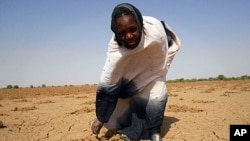The United Nations Children's Fund is reporting that more than 1 million children are facing life-threatening malnutrition due to serious food shortages in eight Northern and Western African countries.
Food insecurity and widespread, acute malnutrition are chronic problems in the Sahel, where UNICEF officials are urging quick action to avert a humanitarian crisis. In 2010, millions of people faced hunger due to poor rainfall and subsequently poor harvest, and UNICEF projects that next year will be even worse than 2010.
The agency says the food and malnutrition crisis, which is expected as early as February, is compounded by the return of some 200,000 migrant laborers, many of whom had been working in Libya for years before the civil war and sending large amounts of money to their families back home. These remittances now are lost.
Most of the migrants come from northern Nigeria, Mali, Niger and Mauritania. Chad, Burkina Faso, the north of Cameroon and northern Senegal also are affected by the food shortages.
David Gressly, UNICEF Regional Director for West and Central Africa, says more than 1 million children in these countries face severe, acute malnutrition - a condition that puts their lives at risk.
“You have a population that constantly lives on the edge and is now being pushed over the edge because of a poor rainfall, compounded by the fact that the situation is a repeat of 2010," from which people have had very little time to recover, he says. "They are being hit with this again and very early on. So we are very concerned that this will have a significant impact, and if we do not respond early, it could result in large loss of life.”
Gressly says UNICEF and other aid agencies are working on an integrated plan to pre-position food and other essential supplies in at-risk countries in the coming weeks. He says each agency, such as the World Food Program and the World Health Organization, has a particular function to perform.
UNICEF’s primary responsibility is treatment of acute malnutrition, which, he says, involves therapeutic feeding to help children recover from the life-threatening condition.
“So, basically, we need commodities [required] for the therapeutic treatment of severe, acute malnutrition, but also related health support, which includes things like vaccinations, clean water [and hygiene] supplies," he says. "In this situation of hunger, then, people and particularly children are much more vulnerable to mortality, to a variety of factors, not just the malnutrition itself. So it is important to have an integrated approach to avoid further deaths.”
While the outlook is alarming, Gressly says there is still time to avert a humanitarian catastrophe on the order of that occurring in the Horn of Africa, explaining that a couple of months remain to get food into the pipeline.
Since countries in the Sahel are landlocked, he says it is important to get started as soon as possible, and that, if an emergency is declared, it will be a lot cheaper to send relief supplies by road than by airplane.
He says UNICEF needs $71 million to provide therapeutic treatment, a figure likely to rise substantially as the crisis strikes throughout 2012.
UNICEF Urges Quick Action in Sahel
- By Lisa Schlein




